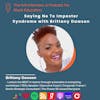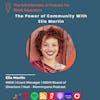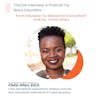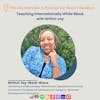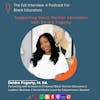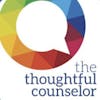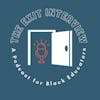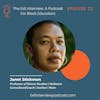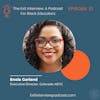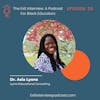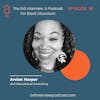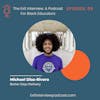
Episode 39: Solo Sabbatical: Battling Burnout, Finding Renewal with Jailyn Jenkins
This episode of The Exit Interview features a deep dive into the experiences and insights of Jail...

This episode of The Exit Interview features a deep dive into the experiences and insights of Jailyn Jenkins, a former STEM educator who transitioned into a role supporting Black educators after facing burnout. Jailyn shares her personal journey, highlighting the significance of mental health, the critical need for authentic recruitment and retention strategies for educators of color, and the transformative power of rest and healing. The discussion also covers the establishment of BEST (BIPOC Educational STEM Thinkers), a community initiative aimed at fostering joy, belonging, and advocacy amongst educators of color. The episode is an inspiring call to action for supporting Black educators, enriching educational environments, and prioritizing well-being in the educational field.
First of all.... have you signed up for our newsletter, Black Educators, Be Well? Why wait?
Amidst all the conversations about recruiting Black educators, where are the discussions about retention? The Exit Interview podcast was created to elevate the stories of Black educators who have been pushed out of the classroom and central office while experiencing racism-related stress and racial battle fatigue.
The Exit Interview Podcast is for current and former Black educators. It is also for school districts, teachers' unions, families, and others interested in better understanding the challenges of retaining Black people in education.
Please enjoy the episode.
Peace out,
Dr. Asia Lyons and Kevin Adams
Episode with Jailyn Jenkins
Jailyn Jenkins: [00:00:00] Some of the work that I do now is rooted in retaining black and brown teachers. But what I would say just generically is move beyond the intent to recruit and actually ground yourself in the intent to retain educators of color, particularly black teachers. We know that racial fatigue is real. Like all the data shows like a disproportionate amount of stress and fatigue in our community.
And so when we move beyond just recruiting people and actually retaining them, honoring the brilliance that they bring to the table, asking their opinion and authentically listening and utilizing that for decision making. One thing that really killed me in my journey was this. faux collaboration. Please do not invite me to a meeting or a committee where you already have the decision made.
If the purpose of the meeting is to have dialogue, by all means, I will give my opinion and my rationale. But if you already have a decision made, honor my time and honor my humanity by giving me the space and just give me the decision. You know, some things I [00:01:00] understand, like I have an admin license. I know some decisions just have to be made, but let's not entertain the bureaucracy and let's just make the decisions.
Keep the kids at the root. And hopefully see the fruit of positive growth, but it has to move beyond recruitment.
Dr. Asia Lyons: Welcome to The Exit Interview, a podcast for Black educators, where we, Dr. Asia and Kev, delve into the crucial but often overlooked conversations surrounding the retention of Black educators. While the spotlight shines in recruiting efforts, we turn our focus to the stories of those who've left the field of teaching.
The Exit Interview aims to spark dialogue among school district administrators, school unions, families, educators, and anyone else passionate about fostering a more inclusive and supportive educational environment. Join us as we elevate these narratives, shedding light on the challenges faced by Black educators and provide invaluable insights for the future of education.[00:02:00]
Welcome to The Exit Interview.
Welcome back everyone to another episode of the Exit Interview. A podcast for black educators with your host, Dr. Asia Lyons. We have another special guest. Every guest we have is special, but this person I've known for a while on and off more off than on, but we keep reconnecting. So super happy that she can be on the podcast before I introduce her.
I'm going to read her bio as always. Jalen Jenkins has built her career on the foundation of belonging, equity, joy, and the daily adventures of learning, striving to install a passion for science. Especially among kids of color. Inspired by curiosity. Nature exploration. Her dedication focuses on cultivating joyful learning experiences and authentic visibility in the STEM field.
Growing up, she navigated diverse spaces and actively carved out room for advocacy and representation in areas where [00:03:00] there were scarce and undervalued. Facing Arizona's early teacher shortage, Jayla started her teaching career before officially earning her STEM education degree from Arizona State University.
After a few years of teaching in Phoenix, she returned to her hometown of Denver to teach and complete her master's in education administration at Grand Canyon University. She then ventured into spaces that allow her to influence and enhance equity centered communities. Becoming a lab host provided her with another platform for advocacy, complimenting her roles as a science instructional coach, staff developer, district facilitator, and public speaker.
After more than a decade of dedicated service, Jalen identified a need to explore and expand into an organization committed to enhancing education systems. And student access comprehensively. Joining the team at the public education and business coalition, PDC. She currently serves as a manager of resident development, innovation, and coaching, [00:04:00] and also as a co founder of the fruitful best BIPOC educational STEM thinkers conference and affinity groups and initiatives rooted in connecting, supporting, and sustaining educators.
Both locally and nationally, because it's hard to be what you can't see. Jalen, welcome to the show.
Jailyn Jenkins: Thank you. It's great to be here. I super
Dr. Asia Lyons: exciting. I just gave your whole bio and of course there's much, much more to it that we'll talk about, but so glad that you had a chance to stop and chit chat with us.
Like I said, at the beginning of the show, we met in 2000. 19
Jailyn Jenkins: something like that. Yeah. Mm
Dr. Asia Lyons: hmm. Yeah. When I was working in the profit
Jailyn Jenkins: sector. Yes. Yeah.
Dr. Asia Lyons: So you were still teaching. So we connected last summer, I feel like, and then again, so it's just been really good to see you moving around at different education spaces.
And so I said, that's why I talked to you at Quakes Coffee. Shout out [00:05:00] to Quakes Coffee in Denver. I said, let's do this podcast thing. Let's share your story. So we're going to start, always start with folks. Tell us about your education journey. How did you know it was time to become a teacher? What was that path like?
We
Jailyn Jenkins: want to hear it all. So my path probably may sound like the typical teacher I knew when I was four. I fit the stereotype of the oldest child, Virgo, all the things. I was teaching my sisters how to do math before they could read. So I was like, you all are going to get this math real quick. So I just have always been intrigued by science, math, and just learning.
And so I just followed through throughout my educational career. And once I got to college, I just knew that was the right path. Despite the money not being what we all know it is, I just decided to continue. And I started actually as a secondary math teacher, and then I realized what kind of hell they navigate in the math spaces as educators.
And I realized I [00:06:00] want to be a teacher that protects the peace and joy of students. And so I said, Science is probably more up my speed, given the flexibility. They're still testing, but there's still more autonomy in the sense of joy. So I took that route. I became a middle school science teacher in Phoenix, and then I came back home to give back essentially to my community that I grew up in.
And I started teaching in Aurora for a couple of years. I did middle school. Then I moved up to high school with my last class of eighth graders. Then I became an instructional coach and district facilitator there. And from then I realized there were some systems that we all know that we navigate and it was probably time for me to explore a broader reach, but also some more autonomy and spaces that allow hard conversations to be had and authentic change to be brainstormed and protected and sustained.
So,
Dr. Asia Lyons: yeah. Yeah, that makes sense. And just backing up a little bit about that navigating teaching as a math [00:07:00] educator, you said that hell. So I taught middle school math. And just to be fair, I taught sixth graders, which I've always called big fifth graders. So it's not even close to what people imagine middle school to be, which is seventh graders.
Tell us about what that was like to be a math educator, a Black woman in these different
Jailyn Jenkins: spaces. It was very interesting just to see how I learned math, but then also taking different approaches to make it fun and engaging because I knew walking into classrooms where students already had this stigma around STEM and trying to help them cultivate this sense of STEM identity, but also just joy in STEM in general was going to be an uphill battle.
A lot of students carry trauma. A lot of adults carry trauma, especially around math and science as well. And so It took a lot of confidence building and resiliency work, essentially, to show that we can do hard things. You can fail. Failure helps you move forward. It's not [00:08:00] like the end all be all, so really just cultivating that sense of agency, curiosity, STEM identity, and the ability to just be resilient in the space of math and science.
Yeah. That's the
Dr. Asia Lyons: tricky part, right? Like, what does it mean to support a student who says, I've never been good at X, I've never been good at Y, and it shifts that mindset sometimes with only a half a semester, sometimes a year, so that you know that the next educator doesn't have to deal with really the trauma that students experience around math, around science, around a lot of subjects that they've, they've been told Well, I wasn't good at math as your parents, so then you can't, you know, and it's just like fighting up against that.
You can kind of move past this, but I do want to talk about what was that transition from teaching and what was your mindset thinking about? I think it's time to leave like a traditional space of education, a classroom space. [00:09:00] And then shifting into other spaces. What was that like for you? What was that decision like for you?
Jailyn Jenkins: So full transparency, that decision came over the span of a year and it was full of grief, if I'm being completely honest, I really wanted to see my last class of eighth graders graduate and the amount of anxiety and probably depression that I was navigating in the year leading up to that decision was.
Extremely taxing. And I had to just figure out, you know, what had the most value essentially. Like, yes, the kids are important and also me making it long term is. doubly important. If I can't support my students, how are they going to see what it looks like to be a happy, healthy, and continuously learning Black woman in STEM and in education?
And so I had to really take a step back and think, okay, I'm feeling stressed out. Is this ever going to get better? There's a possibility for it to get better, but the [00:10:00] system that I'm currently navigating, this little ecosystem is not really showing the progress that I needed to, for me to feel comfortable staying in this space.
And so in this same year that I was navigating the grief and the decision making and all of that, I'd been exposed to other. adjacent educational careers. So I'd seen what outside or outsourced instructional coaching look like. I mean, I'd never really seen myself as an instructional coach until I had a black woman that was a science instructional coach, one of my first year's teaching.
So just the different seeds of visibility made me see what was possible. And it really stamped my career in a positive way because I was just thinking I had to be a principal and I have my license and all the certifications. But I thought that was the path that I had to take. And although I do think I would be good at it, I do value my peace and a sense of balance in my life.
And so I bypassed that just because I want to have a family and vacation and not be addicted to my phone because I'm always on call and every [00:11:00] principal has a different journey and I'm not knocking and I have mad respect for them, but that just was not the path for me, at least right now. And so I had to really.
Get strategic on what values I hold, what I need to do to get to the next step, and then really start exploring. So I thought a PhD would be the next step. And I realized that I needed to heal first before digging into any type of research or any type of new position. And so that's where the healing journey really started.
So I noticed a transition and a transformation in my thinking of yes, the system is absolutely trash, but also I'm deserving of joy, rest, and peace. So I need to pour into myself that way before moving to the next thing so that I'm not carrying this baggage and trauma every single place that I go, I can just speak on it and not feel this angst all the time.
Yeah,
Dr. Asia Lyons: you've said so much, and I wrote down several things. So we're going to stay in this space for a little bit. Yeah, the first thing I wanted to talk about [00:12:00] was this idea of grief. So on our podcast, we talk to people who talk about experiencing grief. with this idea of loss of what they thought education systems
Jailyn Jenkins: were.
Yes.
Dr. Asia Lyons: Loss of friendships that they thought that they're going to have forever because that person or people were not in solidarity with the movement in support of Black women or Black educators. But for you, tell me when you talked about grief, can you tell me more or tell us more about what you mean when you
Jailyn Jenkins: speak about it?
Yeah, so grief, it took on several different facets in that year. The root was I really wanted to see those kids graduate. They really held a special place in my heart. We all navigated COVID in different degrees too, like I moved up from elementary or middle school to high school with them. So they were my last real class that I taught full time.
And I really just wanted to see that through. And when I realized I couldn't do it, I carried a sense of guilt because I feel like I was one of the teachers that they had experienced and a lot [00:13:00] of them vocalize this. That I was one of the first teachers to really believe in them and push them and do all these things.
So I felt this dedication to see it through, but I had to accept that I can still be a pillar in their life, and I can still be someone in the background rooting for them without having to suffer through a system that was clearly not built to help me in any capacity. So I wanted to support the kids, and then I also wanted to help support my science educators.
And just really make it to the full 10 year mark. And I just was like, no, my health is going to take precedence over anything, whether it's mental health, physical health, emotional health, regardless. So the students really was the core behind it, but there were several other things too. Yeah,
Dr. Asia Lyons: it makes sense.
When you were experiencing this last year where you were making these decisions and kind of reflecting and stepping back. If you spoke to family and friends about it and while you were processing, what was that conversation like, people super supportive? Was it a mix of things? Did you [00:14:00] feel like people were afraid for you?
Jailyn Jenkins: How did that look? You know, it's really interesting because all the conversations that I had with people, I think a lot of people were supportive. They obviously didn't know because I wasn't sure either. I just am the type of person that if I'm talking about it, the decisions probably already made. So the processing had already been done behind the scenes.
And so the conversations that I had with my family, one of them stemmed from Abbott elementary love that show, but we were watching episode and I just basically had like a panic attack and just burst into tears because I was like, this is literally. What I'm navigating as an instructional coach. This is what I see at play as an educator.
And my mom was like, it's probably time for you to go. And I was like, I didn't feel like I had to get that sense of approval, but when your parent recognizes it and they affirm that you deserve peace, but then they also give you permission to be like, Hey, you don't have to have it figured out. It's okay to step back.
You'll figure it out. That was [00:15:00] something I really felt like I needed. And I didn't realize that because I was always the accelerated child, whether I was in a gifted program or I was doing great on tests, or I was an exceptional teacher, like I got teacher of the year several times and. I felt this sense of performance and I just had to always be effective.
And so when I felt my inner self was being abandoned, I didn't know where to go. Like my identity was kind of being questioned because that's always who I was. I always just had this sense of curiosity and it just felt like it was being threatened. And so when I had the permission to let go, then I started embracing the unknown of, I don't deserve to be treated like this.
I don't deserve to feel like this. I deserve peace. So those other conversations from that one interaction with my mom actually ended up being more fruitful because I came to the conclusion, if I have to push carts with a master's degree at King Soopers, that's fine, but I need peace. I don't care what I have to do, I'm going to prioritize my peace in this next [00:16:00] space, in this next phase, and there's no tiles, there's no pride that has to be attached to it, because my health comes first.
I absolutely
Dr. Asia Lyons: love that. And I feel like more and more folks are talking about joy and peace and rest in the spaces that I'm in. And it sounds like you were already down the road quite a bit, you know, with that. And I've, I've always said that when I was teaching, that my job, if I, like, hadn't needed to, like, step away, would have been, Putting books back on shelves at the library or putting clothes back on hangers at the thrift store and like hanging things up because I was just at this place so I can't go any further here.
I don't know what is past this. But I can't go any further. And it's interesting that you talk about, like, if I have to do this thing, what we find is when we do have a chance to rest, we do get to get, become much clearer on, okay, like my nervous system is healing or it's healed. Okay. Now maybe I can put the thrift store dream to the side.[00:17:00]
Maybe I could do something else. I absolutely love this. And so my next question, just thinking about your experiences that you just talked about is knowing that there is a Black educator shortage, knowing that here in Colorado, there are less than 1, 000 Black teachers that teach our students every day.
What do you think that school districts, unions, other educators, admin can do? to keep black teachers in classrooms and when I say keep black teachers in classrooms, obviously, well, keep them in their well and hole in themselves. What are some strategies that you feel like would be possible or should be considered to keep black teachers and also recruit
Jailyn Jenkins: black teachers at STAC?
Yes, that's honestly the million dollar question. There's several things and some of the work that I do now is rooted in retaining black and brown teachers. But what I would say just generically is move beyond the intent to recruit and actually ground yourself in the intent [00:18:00] to retain educators of color, particularly black teachers.
We know that racial fatigue is real. Like all the data shows like a disproportionate amount of stress and fatigue in our community. And so when we move beyond just recruiting people and actually retaining them, honoring the brilliance that they bring to the table, asking their opinion and authentically listening and utilizing that for decision making.
One thing that really killed me in my journey was this. faux collaboration. Please do not invite me to a meeting or a committee where you already have the decision made. If the purpose of the meeting is to have dialogue, by all means, I will give my opinion and my rationale. But if you already have a decision made, honor my time and honor my humanity by giving me the space and just give me the decision.
You know, some things I understand, like I have an admin license. I know some decisions just have to be made, but let's not entertain the bureaucracy and let's just make the decisions. Keep the kids at the root. And hopefully see the fruit of [00:19:00] positive growth, but it has to move beyond recruitment. If you recruit somebody and then they see how the sausage is made, they're not going to be retained.
So have the intention and some of the intention comes to fruition through that authenticity, through mentorship, through community. A lot of us, I know I had a coworker a long time ago, we would sit in DEI trainings. And although I'm a firm believer of DEI, She probably recognized that it was exhausting me because amidst sitting in DEI trainings, I was being microaggressed.
And so it's just like, what are you really getting out of that? They would ask me. And so someone would always buy me lunch or coffee. Cause they're like, I'm so sorry about my counterparts. Please go have a tea. And it was just, it's one of the sweetest things. Like I never thought that would ever happen, but it really opened my eyes to people see the system.
It's just a matter of what they're doing to mitigate. The impact on those who are disproportionately affected. Yeah, I absolutely love
Dr. Asia Lyons: all of that. Thank you. And this [00:20:00] full collaboration is so real. Yes. It's so real. The last couple of folks in the podcast have talked about letting, or, Opening spaces for black educators to bring in their authentic voice.
But that part about before, you know, we make the decision, don't waste my time. And I love that humanity play in my face. I love that. So when we get back from our break, there's a couple of questions I have to ask you, and we're going to talk about your exit strategy. Because this is what we were getting into about sabbatical and all the things when we met at the coffee shop.
So we'll be back in a minute and we'll dig into
Jailyn Jenkins: that.
Dr. Asia Lyons: Hey there, beautiful people. It's me, Dr. Asia. Before we dive back into our conversation, Kev and I have something exciting to share with you. Are you a dedicated Black educator or support Black educators? Well, if so, we've got some great news for you.
We're thrilled to introduce the latest addition to our podcast community, the Black Educator Be [00:21:00] Well Newsletter. It's a space dedicated to all things Black Educator healing, wellness, and more. We believe that taking care of our Black Educators is crucial, and this newsletter is designed to do just that.
Picture this, exclusive insights into self care practices tailored for Black Educators, inspiring stories from fellow teachers who've overcome challenges, and tips for creating a positive and supportive environment at work and at home. Be Well. Subscribers will get early access to our upcoming podcast episodes, special interviews with guests, and even some surprise giveaways.
How do you become a part of this amazing community? It's easy. Go to xanterviewpodcast. com or check out the link in this episode's show notes. Now let's get back to the conversation. All right, everybody, we're back. And we're on this episode with Daylynn Jenkins. And she's talking all the things that I love.
Discussing her journey, talking about what it means to grieve, not being able to see your students graduate from high [00:22:00] school, talking about deserving rest and peace. And so we're going to talk about that rest in peace place, because this is really, really important. We met at Quinn's coffee. You talked about going into a different field or leaving teaching the traditional sense.
And you said before I go from one job to the next, I need some space. And you talked about your strategy. You talked about where you went. You talked about all the things and the audience needs to hear every single thing. So I need you to slow walk through this whole process. that you had from the time you decided to leave to the time you started that next job that you are working at right now and you're in this particular
Jailyn Jenkins: part of your career.
Yes, and I will gladly walk through this because it's actually like the two year anniversary right now. It was around this time two years ago in 2022. Where I crawled into one of the classrooms that wasn't being used for testing to call my financial planner and say, Hey, I don't [00:23:00] think I can do this. I don't know if I can make it to May.
This is actually going to kill me if I do not figure out what I need to do. And at this time I had been taking every Wednesday off because I was waking up with crippling anxiety. And that was the only day where I didn't have to teach. So I didn't feel like I was really impeding on anybody else's piece at school.
So that was my two days on, one day off, two days on. And so I had to build this practical strategy to sustain myself longterm. But at that point, I was just like, how am I supposed to make this work? 10 weeks left to school. Can I really, really do this? And at the time there was talk of a black educator stipend that was going to be awarded.
There was talk of that not being applicable to me because I was coaching teachers. And so there were just all of these nuances where I was questioning my value in the space that I was in. And I just really had to evaluate. Is it even worth making it to [00:24:00] the end? Retirement's going to be there no matter what.
So do I really need these next couple of checks? What's the real deal? And by then, you know, COVID had kind of settled down. The economy was what, not nearly where we are now, but I felt like I had more flexibility. And so I had a little pep talk with my financial planner and she was like, Hey, remember, she was also a former teacher, ironically, and she was, Hey, if you make it to May, I'm You have those extra months for a buffer of vacation.
So then you can maybe extend your leave or your vacation for longer if you can make it to May. But I totally get if you need to be done at the end of this month, whatever works, you have to take care of yourself. Just think about the pros and the cons. So that was that little push that I needed because I was able to really sit down and analyze, okay, if I quit now, what are the implications?
What are the positives? If I make it to the end of the year, May like 24th, what are the implications? What are the pros? And so [00:25:00] I really had to dig in and launch my day at a time attitude. I couldn't think a weekend ahead anymore. I really had to dig in for each day and find joy each day, whether that was outside and taking a walk, whether that was making breakfast for dinner, whatever it could have been.
I really had to find that glimpse of joy each day and Honestly, I would say probably in a week, my skin just showed a difference. And that really showed me like, okay, if I do this, I can sustain myself for the rest of this year. I can let go in peace. And when the kids graduate, I can come back, be healed, and maybe give them a check when they're ready to leave.
And so I really was able to just dig in, like I said, to that day at a time approach, find the daily joy. And through that, I was able to literally make it to the end of the year. And when I made it to the end of the year, I ended up getting the bonus. They advocated that I'm teaching. So I should be getting the [00:26:00] bonus for retention.
So shout out to the people in the background who were able to do that. And through that, I felt like I could justify taking sabbaticals in vacations. And so I needing to back up for just a second, when I was weighing the pros and the cons of. Leaving early. I was at the point where I said, if I have to pull my retirement and live off of that, I will do that because I'm still worthy of an investment internally to protect my peace and to pause and really rest.
And you don't realize how much you're doing until you take just a day to literally sit still guilt free. And how much you're carrying, just all of that. So I was debating, like, do I just live off of retirement until I find a job? What strategy should I take? And so that bonus and making it to the end was helpful because I was getting paid through the summer.
And then I also got the bonus. And then I had, if I needed to pull some retirement, I could do that. Some people agree with it. Some people [00:27:00] don't. But in my opinion, some of the systems, specifically here in Colorado, teachers don't make enough to be having that much money taken out of their checks because that was more than anybody could ever save in a lifetime.
And I'd only been teaching in that district for five years. So it was really interesting to see how I was having to live and how others had to live and what was being taken out of checks. So that's my own other spiel, but I really had to think about the financial aspect and the implications. So when the end of the year came, I took June to just hang out with my friends, rest, take care of my house, do those types of things.
And when July came, I knew I wasn't working in July for the first time in 10 years. So I took the time to really go see the world. And one of the things that I knew I needed to do was go regulate my nervous system. And I started this venture of solo travel. And I took myself to a lavender farm and the lavender farm in New Mexico is [00:28:00] one of my favorite places on the planet.
I love lavender. Like if I have a girl, I'm naming my child lavender, like I am dedicated. So the lavender farm was a great space for me to launch solo travel because I was able to really sit with myself and do some stuff for my business, but also really just take a pause and think about the ways I'm showing up in the world and what's exhausting me, what's filling my cup up and just really think about what I needed to then move forward to the next space.
For example, personally, I don't like going from relationship to relationship. I want to take a pause, like regardless of the time length, just taking a pause to reflect, take those lessons and move forward. The same thing goes with your relationship with the workplace. And so I felt like I had a lot of baggage that required me to go sit on a farm, eat top tier food, sniff some lavender and go on some adventures.
And that was so healing to me. Like you could see my waitress at the end of the trip. [00:29:00] She was like, you look so refreshed. You can see it in your face. You look like you've been healed. And I was like, yeah, I honestly need to buy a plot of land right here, to be honest, because this is what I needed. And so that was the inner work that I had to do.
That wasn't always looked at as so pretty. It was a pretty location, but that was hard to do to just sit down for a couple of days. and really dig into why am I feeling this? What went well here? How do I move forward from here? And then I came back home, debriefed with myself, got back into society, and then I took myself to Hawaii.
for five days then. So I did five days in New Mexico, five days home, five days in Hawaii, and I wanted to go to D. C., but D. C. The flight one way was the price of a round trip flight to Hawaii. So I was like, yeah, I'm going to go to an Island anyway. So let's just make it happen. So I went to the big Island [00:30:00] on the more secluded side and I just got to just see nature and be immersed in it.
And I was right on the beach water is known to be healing and peaceful and all the things. And so I just really. Woke up every day and just kind of yoloed it. Like some days I'd wake up and just go sit at the beach and snorkel. And some days I'd wake up and go to the other side of the island and go adventure.
And it really just depended on what I woke up and felt like I needed in my spirit. And that's really how I moved. And when I came back from that, I felt like I could actually work. And some more context, probably two weeks after I came back from Hawaii, I did start my job that I'm currently at. And I tell people this all the time, people who want you will respect your time off.
And I could have started my current job in July, and I could have missed out on both of those healing experiences and just chugged along, chugged along and been a little worker bee. But I said, Hey, like Jalen, you already know you have a [00:31:00] saying yes problem. Sometimes like you just want to do all the things and you know, you're doing good work, but it's time for you to put yourself first.
So I said, Hey, I can start in August. I need to get these things done. I need to transition all the things in life first, then I can come join your team. And everyone was just fine with that. Super respectful, adamant, even like, yeah, totally do that. Take care of yourself. And when I started in August, night and day, night and day, if I would have started in June, I would have been burnt out by December.
And I probably would not have had the creative space of best that we created months shortly after I joined the team. If I had not taken that pause and in my workplace, right after I joined, we started reading the four pivots. And that was something that had reawakened myself as well. I just learned to really appreciate.
The slowdown, getting clarity about who I am, what I want to stand for, what [00:32:00] imprint I want to leave on the world, and just do all that kind of thinking. And that is what shifted my perspective of, do I need to fight all the time, or do I want to reimagine what's possible? And fighting is important. Things need to be dismantled, but in the process, we're still worthy of joy and, you know, belonging and community.
So yeah.
Dr. Asia Lyons: Folks, I hope you had your notebooks. I wanted to really say something about this idea of pulling out of retirement, if need be, because I've had so many folks Who called me, who emailed me and said, I'm willing to leave teaching. What should I do next? And I said, really, you should take some time to heal.
And they'll say, I don't have money for that. And I don't know how many of those folks have retirement. I have no clue. I've never asked it, but we've been told so often, don't touch your retirement. The taxes, the, the, the, the. And that fear mongering as if, and I think this is a thing that people [00:33:00] don't really seem to be thinking about.
If you are at a mental space where you are just not your full self, how do you know you'll make it to retirement? Exactly. Right. Or how do you know, because you're crying, you're having all these panic attacks. All these high blood pressure, all these other things that you won't have to pull out of your retirement for your medical bills.
Exactly. Right. And so I'm going to put it out there to folks listening. If you have retirement, I mean, we're not saying pull the whole thing. Who knows? We don't know your financial situation, but if five or 10, 000 or 200 or whatever is going to get you to sit your behind down a lavender farm or go visit family or so go sit in a yurt.
Or drive and circ, whatever it is, isn't it worth it, right? We have to question some of the things we've been sold about, like, you have to save the, you have, like, but do you really have to, right? Especially like Jalen just said, I'm so much better for it. And so when you [00:34:00] told me that at Quinn's and I said, we have to have you on the podcast because so many folks are just at this place of, I can't go forward any more than I'm at a breaking point.
I need to take a break. And I don't know how to do that. And so this is something that folks are doing. I'm talking to the audience right now. People are figuring these pieces out. It's a bonus, whatever it is, to get them to sit down for a couple of weeks or a month. Shout out to Rhonda, who's been off for a year since she kept her some mad money, right?
But that healing is important. And yes, obviously for you, but it's also important for the next people you work with. They don't want somebody that's snapping on edge and crying at their, at their desk and just being off in this new space because you assumed you will be better because you have a new job.
You take that trauma with you. Exactly. Yeah. Love this. I love this. So I had to get down to the meat and potatoes. That was a question that was [00:35:00] burning all in my soul, but I'm going to backtrack a little bit. A question we love to ask on the podcast is, is there an educator, a Black teacher that you'd like to shout out on your episode of The Examiner?
Jailyn Jenkins: Ooh, got me on the spot. There's several. Go for it. Okay. There's a couple. So second grade, my first black teacher, Miss Gray, and then in college and my professional career, LaJoy Gardner and Nicole Scales, they were the visibility that I needed to see, to see myself beyond just a principal, not that a principal's a shot at anything, but just beyond just that trajectory.
And then my teachers at best, my educators and STEM professionals in the best conference affinity groups. They inspire me and they drive me every day. That's my brainchild. That's my baby. So them, and then my KP fellows that we support, we have a group of BIPOC lab hosts that we are cultivating and coaching [00:36:00] over this past year, essentially.
And they also drive a lot of my work because I can see tangibly. how education's impacting them, keep a pulse on education firsthand, but then also support and sustain educators of color. It's a big list, but those people.
Dr. Asia Lyons: I love that. That's a perfect lead on to our next question, which is, you've left a school district's traditional space of education.
What are you doing now? Tell us about BEST. Tell us all the things we want
Jailyn Jenkins: to know. Yes, so I work for a non profit that's locally. Known here in Denver, but it's nationally supporting educators called PBC public education and business coalition. I'm a manager of resident development, innovation, and coaching.
So what that means is I support the incoming teachers, people who typically have pursued like a career change and they are pursuing alternative licensure. So I coach them. I teach them different lessons from culturally responsive pedagogy. [00:37:00] to how to write a lesson plan. It just really is a whole different continuum of how we support these educators.
And then another part of my role is professional learning, where I go around the country and I provide professional development to educators, particularly in STEAM, but other things as well. So we have math institutes that will do math justice, stuff like that. So those are my two facets of my role, but out of that hybrid role came BEST.
And me and my partner in crime, Sathya Wanzek, she and I created this brainchild of BEST. BIPOC educational STEM thinkers. And that really is a space for educators of color, community members of color, STEM professionals of color to come together and create this sense of community belonging, joy, and healing in this space.
Initially it was geared solely toward educators, but we had a large amount of people who support education and wanted to [00:38:00] create this space. Interdependent sense of an ecosystem, like mentoring and stuff like that. And they also needed that community too. So I found out quickly that this was a unique opportunity to bridge the gap between let's say engineers and teachers to continue to enhance that pipeline and exposure for young kids so they could see themselves in the profession as well.
So that is my bread and butter. Oh, I
Dr. Asia Lyons: love that. That's fantastic. And BEST is having its next conference. Tell us about the when, the where, the
Jailyn Jenkins: how. Yes, so the next BEST conference is June 29th and 30th. It's a weekend and it's going to be hosted at the Denver Museum of Nature and Science. This is just a two day conference where we, like I mentioned, get to cultivate joy, community belonging, and awareness in this two day, essentially, retreat.
We get exclusive access to the museum, to the zoo, and different sponsors have created different experiences for our [00:39:00] participants. We have things from like a panel to different STEM activities. It's really just a space to connect with people and cultivate that sense of STEM joy, because a lot of people didn't have the chance to see themselves in these fields and also in these spaces.
And to just embrace their inner genius. So this is what we've created to do so. So folks, if
Dr. Asia Lyons: you're in the Denver area in that time, please make sure that you find out more information. We'll have a link to register or get more information in the show notes. Yes. Last question that we ask folks, what's bringing you joy these days?
Jailyn Jenkins: Ooh, what's bringing me joy these days? Honestly, walking has really been doing it for me between taking walks on sunny days to jumping at trampoline parks, to just having a good meal with someone I haven't had the chance to connect with lately that has really been giving me joy and two other things, getting sleep, water and reading for pleasure instead of just reading for work.
So balance. [00:40:00] Is really just the synthesized answer. I love
Dr. Asia Lyons: the trampoline part piece, because I remember when you were at Quince, you had a trampoline bracelet on it and I was like, I know she don't have no kids, so what's going on? And talk to us a little bit about that, please. How did you come about thinking that was something that you wanted to do just on a
Jailyn Jenkins: whim?
Yeah, I grew up with the trampoline, so I love just like bouncing around, to be honest. And all the time, I don't want to throw weights. Like I do weightlifting. I've been doing that for years and years and years, and sometimes you need to switch it up. And I believe in unleashing your inner kid. I have a membership too.
a trampoline park where I go to a couple times a month and just jump around, flip, do whatever I got to do, have some fun, and then go back to work. So I believe in having like a kid friendly, a kid child based, like releasing and healing your inner child activity.
Dr. Asia Lyons: All right, folks, you heard it. All the gems from Jaylen's episode.
Dana, thank you [00:41:00] so much for coming on the podcast. Thank you so much for reconnecting with me so long ago when we were at the golf place where we were at the fundraiser. And one last thing, if people want to email you or reach out, what's your email address?
Jailyn Jenkins: My email is Jalen period Jenkins seven at gmail.
com. And then my professional one is J Jenkins. at P E B C dot org.
Dr. Asia Lyons: Awesome. All right, you all, that was another FIRE episode. If you have questions, you want to reach out to us, you want to be on the podcast, support the podcast, let us know. Until next time, peace.
Thank you for tuning in to another episode. We hope that you've gained valuable perspectives and a deeper understanding of the conversation surrounding Black educator retention. As we conclude this episode, we encourage you to join our Patreon to support our work. Plus, as a patron, you receive bonus episodes, March giveaways.
Stay engaged with us on our social media. Sign up for [00:42:00] our newsletter in the show notes. Take a look at our YouTube page and interact with us on our website. Remember, the stories we've shared today are just the beginning and your participation is vital for the future
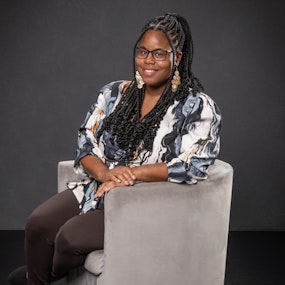
Jailyn Jenkins
STEAM Educator • Advocate • Wellness Enthusiast • Entrepreneur
Jailyn Jenkins has built her career on a foundation of belonging, equity, joy, and the daily adventures of learning, striving to instill a passion for science, especially among students of color. Inspired by curiosity, nature, and exploration, her dedication focuses on cultivating joyful learning experiences and authentic visibility in the STEM field. Growing up, she navigated diverse spaces and actively carved out room for advocacy and representation in areas where they were scarce and undervalued.
Facing Arizona's early teacher shortage, Jailyn started her teaching career before officially earning her STEM Education degree from Arizona State University. After a few years of teaching in Phoenix, she returned to her hometown of Denver, to teach and complete her Masters in Education Administration at Grand Canyon University. She then ventured into spaces that allowed her to influence and enhance equity-centered communities. Becoming a lab host provided her with another platform for advocacy, complementing her roles as a science instructional coach, staff developer, district facilitator, and public speaker.
After more than a decade of dedicated service, Jailyn identified a need to explore and expand into an organization committed to enhancing education systems and student access comprehensively. Joining the team at the Public Education and Business Coalition, she currently serves as the Manager of Resident Development, Innovation, and Coaching. Jailyn also is the co-founder of the fruitful BEST (BIPOC Educational STEM Thinkers) Conference & affini… Read More
New to The Exit Interview: A Podcast for Black Educators?
Here are some great episodes to start with.

















